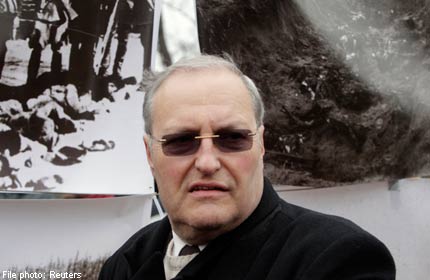
BERLIN- The Nazi-hunting Simon Wiesenthal Center hung posters on the streets of major German cities Tuesday seeking information on the last perpetrators of the Holocaust still at large nearly 70 years on.
The 2,000 placards displayed in cities including Berlin feature a chilling black-and-white photograph of the Auschwitz-Birkenau death camp and the tagline: "Late but not too late."
Part of the Wiesenthal Center's "Operation Last Chance" to catch the surviving suspects behind World War II-era atrocities, the signs offer a reward of up to 25,000 euros (S$41,635) for information leading to the capture and conviction of such criminals.
"We expect to get tips about people who served in the death camps or in Einsatzgruppen (mobile death squads) and in that way to help bring them to justice," the campaign's initiator, Efraim Zuroff, told AFP.
"But of course you realise that such a campaign also raises public interest (and serves) as a reminder of the importance to bring those people to justice."
Zuroff heads the Jerusalem office of the Simon Wiesenthal Center, the Los Angeles-based organisation named after the Holocaust survivor who was perhaps the best-known Nazi hunter until his death in 2005.
The posters, which will confront Germans on their high streets, pack an emotional punch.
"Millions of innocents were murdered by Nazi war criminals. Some of the perpetrators are free and alive," they read. "Help us to bring them before a court."

Zuroff estimates that only around 60 potential defendants are still alive. He dismisses the idea that they should be shown clemency given their advanced age.
"In my 33 years of hunting Nazis I never once had a case of a Nazi who ever said he was sorry," he said.
"Don't look at these people and see a frail old man or woman, think of someone who at the height of his physical strength devoted his energy to murdering innocent women and men. These are the last people on Earth deserving any sympathy because they had absolutely no sympathy for their victims."
Zuroff said a precedent set by the conviction in Germany in May 2011 of former camp guard John Demjanjuk had opened the door to a renewed effort to bring others to book.
A Munich court sentenced the Ukrainian-born Demjanjuk to five years' imprisonment for helping the Nazis kill almost 30,000 Jews during his time at the Sobibor extermination camp in German-occupied Poland during World War II.
In a legal first, it found that simply demonstrating Demjanjuk's employment at the camp, rather than his involvement in specific murders, was enough to implicate him in the killings committed there.
Two recent cases, in Hungary and Germany, underlined a new commitment by European authorities to capture the very last of the alleged perpetrators after decades of foot-dragging.
In June, acting on a tip from Zuroff, Budapest prosecutors charged Laszlo Lajos Csatari, 98, with organising the deportation of 12,000 Jews to death camps.
His trial is due to start in September. He denies the charges.
German police in May arrested alleged former Auschwitz guard Hans Lipschis, 93, on charges of complicity in mass murder.
Lipschis insists he only worked as a cook at the extermination camp.
His capture revived a charged debate on whether a measure of justice can be too late in coming.
Fellow Nazi hunter Serge Klarsfeld told AFP that the 11th-hour bids to see justice done using a lower standard of proof based on the Demjanjuk precedent left a "bitter aftertaste".
"A principle is being applied that is more Soviet than democratic: you were at a camp thus you are guilty," he said. "It's up to you to prove your innocence."
He said the German justice system had in the critical postwar years not lived up to its responsibilities.
"At the time when it was possible to try the criminals, when there was evidence, Germany failed to do its work," he said.

